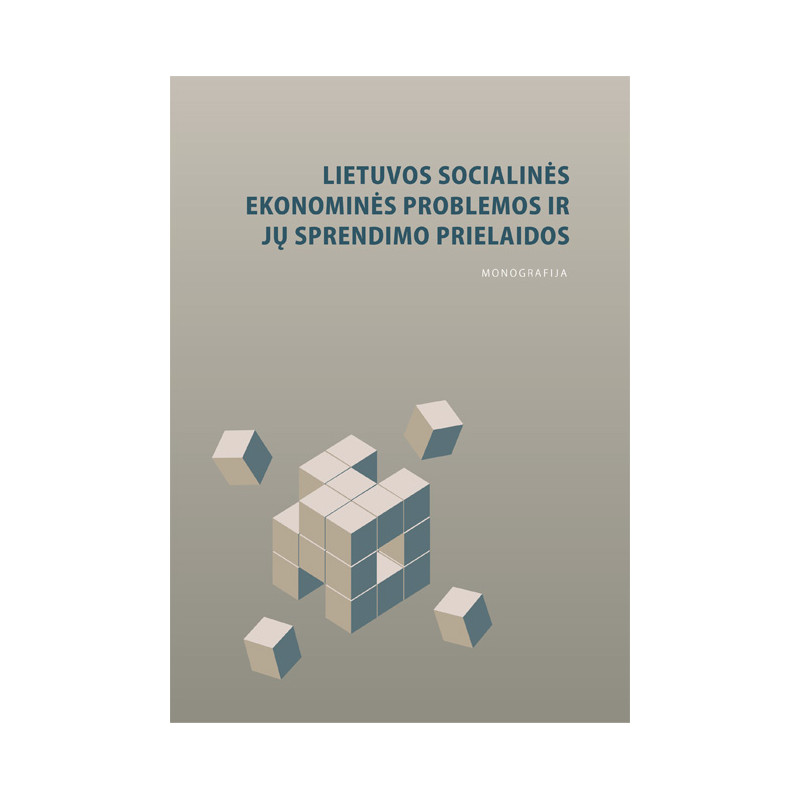
Reference: 918096
Statybinės keramikos charakteristikų ir technologinių parametrų reguliavimo galimybės
Romualdas Mačiulaitis, Jurgita Malaiškienė Monograph (in Lithuanian)


Ilona Skačkauskienė, Laima Okunevičiutė Neverauskienė, Rasa Zabarauskaitė, Daiva Andriušaitienė, Živilė Tunčikienė
Mongraph (in Lithuanian)
Socio-economic policy is one of the main priorities of Lithuania as well as of many other countries and the European Union. The study starts with the analysis of socio-economic development in Lithuania and the examination of the national budget which is one of the most important tools for socio-economic policy. The above mentioned section deals with the theoretical and methodological aspects of the budgetary process in relation to practices implemented in Lithuania. While inspecting the budget as a tool for public governance, a quantitative analysis of the budgetary policy of the Republic of Lithuania is carried out thus investigating the links between the priorities of the Government of Lithuania and public expenditure. The following section presents the situation in the Lithuanian labour market, looks at employment and unemployment indicators in different economic sectors and introduces changes in the market taking place over the last decade. The monograph further examines the indicators of dynamics of income inequality and relative poverty in Lithuania: focuses on the main tendencies towards income inequality and poverty as well as proposes the possible ways of poverty and income inequality alleviation. After analysing the phenomenon of living on benefits as well as the main causes and economic consequences of emigration and immigration, the book formulates problem-solving strategies. The quality of the performance of public sector institutions has a significant influence on NATIONAL socio-economic development. Therefore, the last section of the study is devoted to strategic planning as an effective instrument for increasing the performance of public sector institutions. The conducted analysis suggests that effective institutional strategic planning requires not only a consistent legal framework but also employee initiatives and creative freedom.
The monograph has been designed for policy makers dealing with the socio-economic issues as well as for academic community engaged in public governance.
Electronic version of the book:
Data sheet
Reference: 918096
Romualdas Mačiulaitis, Jurgita Malaiškienė Monograph (in Lithuanian)
Reference: 916872
Saulius Vaikasas Monograph (in Lithuanian)
Reference: 910611
Juozas Bivainis, Živilė Tunčikienė Monograph (in Lithuanian)
Reference: 917270
Artūras Kaklauskas, Edmundas Kazimieras Zavadskas Monograph (in Lithuanian)
Reference: 907428
Dalia Dijokienė Monograph (in Lithuanian)
Reference: 918120
Vladas Vekteris, Mindaugas Jurevičius, Algis Daktariūnas Monograph (in Lithuanian)
Reference: 919098
Dalius Navakauskas, Artūras Serackis, Dalius Matuzevičius, Raimond Laptik Monograph (in Lithuanian)
Reference: 32329
Almantas Samalavičius Monograph
Reference: 917723
Tomas Kačerauskas Monograph
Reference: 31145
Eugenijus Blochinas, Stasys Dailydka, Leonas Povilas Lingaitis, Liudmila Ursuliak Monograph (in Lithuanian)
Reference: 917286
Juozas Stražnickas Monograph (in Lithuanian)
Reference: 916208
Romualdas Ginevičius, Narimantas Kazimieras Paliulis, Eugenijus Chlivickas, Juozas Merkevičius Monograph (in Lithuanian)
Reference: 31464
Borisas Melnikas, Rūta Banelienė, Eugenijus Chlivickas, Artūras Jakubavičius, Liudmila Lobanova, Eigirdas Žemaitis Collective monograph (in Lithuanian)
Reference: 916232
Pranciškus Juškevičius, Virgilijus Valeika, Marija Burinskienė, Gražvydas Mykolas Paliulis Monograph (in Lithuanian)

Ilona Skačkauskienė, Laima Okunevičiutė Neverauskienė, Rasa Zabarauskaitė, Daiva Andriušaitienė, Živilė Tunčikienė
Mongraph (in Lithuanian)